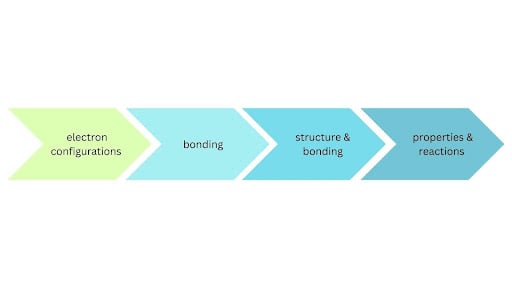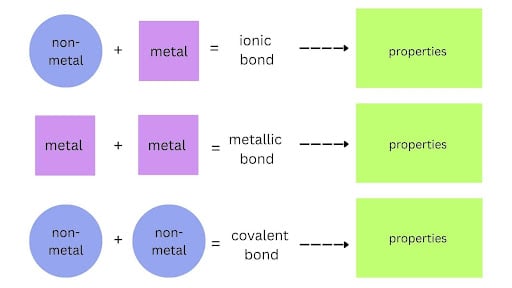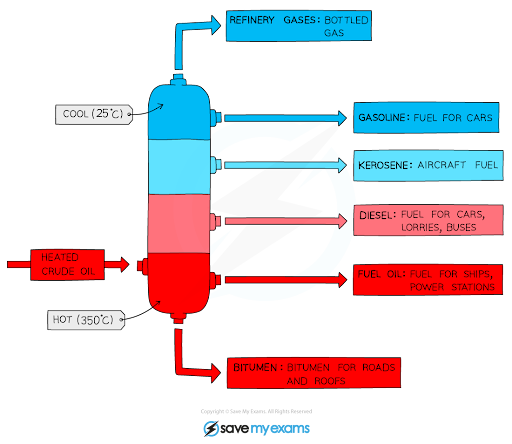What is IGCSE Chemistry? Student Overview
Written by: Philippa Platt
Reviewed by: Richard Boole
Published
Contents
Thinking about taking IGCSE Chemistry but not quite sure what you’re getting yourself into? You’re in the right place!
As a teacher with over 15 years of experience, I’ve seen many students arrive curious but a little nervous, and leave with a new confidence in how the world works at its most fundamental level. Let’s break down everything you need to know about this fascinating subject, from what you’ll actually learn to how you’ll be assessed.
This guide brings together everything you need to know:
What IGCSE Chemistry covers
How exams work
The study strategies that I’ve seen unlock understanding and confidence time and time again.
IGCSE Chemistry overview
IGCSE Chemistry is your gateway into understanding the amazing world around us at a molecular level. It’s part of the internationally recognised IGCSE science pathway, taken by students around the world between ages 14–16.
Think of chemistry as the detective work of science. You’ll discover how atoms bond together, why reactions happen, and what makes different substances behave the way they do.
The course focuses on four main areas:
The study of matter
Chemical reactions
Energy changes
Atomic theory
These might sound intimidating now, but I promise you that once you start exploring them, they’re full of those “lightbulb” moments that make Chemistry so rewarding.
You can study IGCSE Chemistry through two main exam boards: Cambridge International Education (CIE) and Pearson Edexcel. Both are globally recognised, so whichever you take, you’re working towards a qualification that opens doors worldwide.
What will you learn in IGCSE Chemistry?
Ready for the exciting bit? Here's what you'll be exploring over the course of your IGCSE Chemistry journey.
Core Topics
Atomic structure and the Periodic Table:
You'll start with the building blocks of everything - atoms! You'll learn how they're structured and why the periodic table is arranged the way it is.
Chemical bonding and properties of substances:
Ever wondered why water is liquid but carbon dioxide is a gas? You'll discover how atoms stick together and how this affects what substances can do.
Acids, bases, and salts:
From the lemon juice in your kitchen to the antacid tablets in your medicine cabinet, you'll explore how these important chemicals work in everyday life.
The Mole concept and stoichiometry:
This is where maths meets chemistry. You'll learn to calculate exactly how much of each substance you need for reactions, like following a very precise recipe.
Rates of reaction and equilibria:
Why do some reactions happen instantly, whilst others take ages? You'll find out what speeds things up or slows them down.
Organic chemistry:
Welcome to the chemistry of life! You'll study carbon-based compounds that make up everything from plastics to the food you eat.
Chemical energetics and electrolysis:
Discover why some reactions release energy whilst others absorb it, plus how electricity can drive chemical changes.
Environmental Chemistry and pollution:
Learn about the chemistry behind environmental issues and how science helps us tackle climate change.
These topics build on each other. So, understanding the basics helps with the more complex ideas later on.
Assessment in IGCSE Chemistry
Assessment in IGCSE Chemistry is 100% exam-based, so there’s no coursework to worry about. Depending on your exam board and tier, you’ll usually sit two to three written papers that cover all the key areas of the course.
If you’d like a deeper breakdown of the subject content, have a look at our IGCSE Chemistry Topics guide. Each board offers different options.
Edexcel IGCSE Chemistry | Cambridge IGCSE Chemistry | |
Tiers | Foundation Tier (Grades 1–5) Higher Tier (Grades 4–9) | Core Curriculum (Grades C–G) Extended Curriculum (Grades A*–G) |
Number of Papers | 2 papers (Paper 1 + Paper 2) | 3 papers Paper 1 = MCQ Paper 2 = Theory Paper 3 = Practical (ATP) |
Content Coverage | Same specification for both tiers, but questions are set at different levels of demand | Core covers essential concepts Extended includes Core + extra depth and challenge |
Practical Assessment | Practicals examined in papers 1 & 2 | Practicals are covered in Papers 1 & 2 but have a dedicated Paper 3 |
Global Recognition | Widely used internationally; also taken in UK schools | Very widely used worldwide; benchmark international qualification |
What skills will you build in IGCSE Chemistry?
IGCSE Chemistry isn’t just about memorising facts. The real value comes from the transferable skills you’ll develop, skills that will help you in other subjects, in further study, and in everyday life.
Scientific reasoning and problem-solving
These become second nature as you learn to think logically about chemical processes.
An example of this is looking at electrolysis (Electrolysis Exam Questions).
By breaking the problem into clear steps you train yourself to think like a chemist:
Identify the ions
Apply the rules
Predict the products
Working with chemical equations and formulae
This might seem scary at first, but it's like learning a new language that describes how atoms and molecules behave.
With practice, balancing equations becomes a logical puzzle where every atom must be accounted for.
Exam questions often reward this step-by-step approach.
Have a look at some examples of questions involving common GCSE chemical calculations.
Practical lab skills and data interpretation
These give you hands-on experience with real scientific equipment and help you understand how scientific discoveries are made.
For me as a teacher, guiding students through experiments is one of the most rewarding parts of GCSE Chemistry. It’s where abstract ideas come to life.
Even a simple flame test can spark curiosity and excitement when you see those colours appear before your eyes.
These skills are tested in practical exam questions.
So, the more you link your practicals to your notes, the more confident and prepared you’ll feel when tackling them in an exam.
Critical thinking and applying knowledge
This includes using new scenarios to prepare you for tackling unfamiliar problems, both in science and beyond.
In exams this might look like applying your understanding of bonding, energy, or equilibria to a context you’ve never seen before
For example:
You might be told that a new compound only conducts electricity when molten
You then use your knowledge of ionic bonding, lattice strength, and equilibrium shifts to explain its behaviour.
Questions like these show examiners you understand the science, not just the memorised facts.
How to Do Well in IGCSE Chemistry
Understand the basics first
Chemistry is like building a house, you need solid foundations. Master the atomic structure, bonding, and Periodic Table topics first. These ideas turn up everywhere:

When you see the patterns, the rest of the course starts to click. There are patterns in:
Groups
Periods
Valency
Behaviour of metals and non-metals
Don’t rush these topics. Take time to understand why atoms behave as they do and how the periodic table is organised. Once those rules feel natural, calculations, mechanisms, and exam questions become far less intimidating.
Teacher’s tip: Build a “foundations routine” once a week:
Using the Periodic Table write electron configurations for the first 20 elements.
Use a quick flowchart to decide bonding type and predict one property that follows
For example:

Ten focused minutes like this pays off massively when topics get tougher.
Learn through practice
Regular practice with exam questions:
Builds your confidence
Helps you spot patterns in how questions are asked.
Start with simpler questions and gradually work up to more challenging ones. Each time you get something wrong, use it as a learning opportunity to strengthen your understanding.
Past papers from exam boards like (opens in a new tab)CIE and Edexcel are invaluable for this practice.
Make the most of practicals
Don’t just go through the motions in practical lessons, really think about why you’re doing each step. Every experiment has a purpose, whether it’s testing for ions, measuring rates of reaction, or exploring energy changes. I always remind my students that the lab isn’t about “ticking off” an activity. It’s a chance to see the theory from your notes come alive in front of you.
In our IGCSE revision notes, we have guidance on each practical for your GCSE courses. These give practical tips, so are useful both before and after your lessons. Even something straightforward, like investigating how the concentration of acid affects the rate of a reaction, can suddenly make collision theory click in a way that reading alone can’t.
Use visual aids
Chemistry involves lots of abstract concepts that become clearer with visual representation:
Revision posters can help with chemical structures
Flashcards help you remember key facts and equations
Diagrams and flow charts can help with complex processes
For example, fractional distillation is a process you’ll often see tested in GCSE Chemistry. A great way to prepare is to be able to draw and explain how the fractionating column works. Visualising it in this way makes it much easier to recall in the exam.

The process separates the fractions according to their boiling point
Many students find that colour-coding different types of information helps with memory and understanding.
In class, I often ask students to cover up a diagram they’ve drawn and then try to sketch it again from memory. It’s a quick self-test that shows you instantly which parts you’ve really understood and which bits you need to revisit.
For more information and tips, check out this article ‘Is IGCSE Chemistry Hard’ and ‘How to Revise for IGCSE Chemistry’
Frequently Asked Questions
What is the difference between IGCSE and GCSE Chemistry?
IGCSE Chemistry is internationally focused and often considered slightly more challenging than traditional GCSE Chemistry. The content is similar, but IGCSE tends to go into more depth on certain topics and uses more international examples and contexts.
Do I need strong maths skills for IGCSE Chemistry?
You'll need to be comfortable with basic mathematical operations, percentages, ratios, and simple algebra. Most of the maths in IGCSE Chemistry is at foundation level, so don't let this put you off if maths isn't your strongest subject.
Is IGCSE Chemistry required for A Level Chemistry?
Most schools and colleges do require IGCSE Chemistry (or equivalent) for A Level Chemistry. It provides the essential foundation knowledge you'll need for the more advanced concepts at A Level.
What are the best revision resources?
The most effective approach to revision really does vary from student to student, so it’s worth experimenting until you find what suits you best.
In my experience, the strongest revision plans combine different types of resources, for example, using class notes and textbooks to build understanding, past papers to practise exam technique, flashcards for key definitions, and videos or diagrams to bring abstract processes to life. Mixing these methods keeps revision fresh and helps you strengthen both your memory and your problem-solving skills.
School textbook and notes | |
Study groups with classmates | |
How are practicals assessed in the exam?
You won't repeat the actual experiments in your exam, but you'll answer questions about them. These might ask about:
Method
Safety considerations
Expected results
How to improve the experiment.
Keep detailed notes about each practical, including the equipment used, safety precautions, and the scientific principles being demonstrated.
Final thoughts
After teaching Chemistry for over 15 years, I’ve seen students of every ability and background succeed. Many of these students started out doubting themselves. The biggest difference wasn’t “natural talent,” but perseverance, curiosity, and the courage to keep asking “why?” If you stick with it, Chemistry will reward you with a way of seeing the world that very few subjects can offer.
Whatever your learning style or starting point, there’s a strategy that will work for you. Embrace the journey of discovery Chemistry offers, you might be surprised by just how fascinating and empowering it becomes once the pieces start falling into place.
IGCSE Chemistry might seem daunting at first, but it’s also one of the most rewarding subjects you can study. Every lesson reveals something new about how the world works at its most fundamental level from the atoms in your body to the fuels that power our lives.
With persistence and the right support, you can not only master GCSE Chemistry but also open doors to exciting opportunities in the future. Don’t forget online resources, either. Save My Exams is full of tools designed to support your learning throughout your GCSE Chemistry course. You can:
You don’t have to use it all in one go, but building a habit of using what’s already available will give you a real advantage. That’s what smart preparation looks like.
References
CIE IGCSE Chemistry Specification (opens in a new tab)
Edexcel IGCSE Chemistry Specification (opens in a new tab)
Was this article helpful?
Sign up for articles sent directly to your inbox
Receive news, articles and guides directly from our team of experts.

Share this article
 written revision resources that improve your
written revision resources that improve your